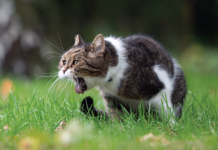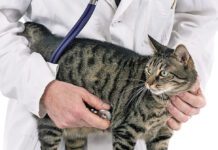Q. I am an 11½-year-old neutered domestic gray tabby. My vet said that I have hyperesthesia. This was my first attack. I see my vet every six months (or more), am an indoor cat, and I have an excellent diet and much loving attention. My human mom rescued me as a kitten in the wild.What causes hyperesthesia? Is there effective treatment or a cure? How serious is it? Thank you for any help you can offer. — Sammy
A. As you know, we cats are very sensitive creatures, but in your case, as with other cats with feline hypersensitivity syndrome (FHS), this sensitivity seems to be ratcheted up. FHS is a recognized syndrome in the feline world, although the definitive cause is not clear.
While it is not, in and of itself, believed to seriously affect overall health or longevity, a few important points regarding this unusual behavioral syndrome are worth making, especially for our human friends who are commonly puzzled by its manifestations.
FHS, also variably referred to as rolling skin syndrome and atypical neurodermatitis, is characterized by dramatic twitching or rippling of the skin, most commonly on the back between the middle of the spine and the base of the tail or in the flank region, with intermittent jerking of the body and exaggerated tail movements.
Affected cats may vocalize or dart about wildly, and they often appear agitated and may obsessively chew at their back, the base of their tail, or their flank. They are often very sensitive to touch during episodes. In extreme cases, they may appear stuporous or depressed, may become overly aggressive or affectionate, may appear to be seeing things that aren’t there, or they may stare off into space.
Cats with FHS may demonstrate dilated pupils during episodes, and the obsessive grooming or chewing that may be observed in affected cats may lead to loss of fur or to abrasion of the skin with secondary bacterial infection. In very advanced cases, episodes may be followed by grand mal seizures characterized by paddling of the feet, urination and/or defecation and salivation.
A definitive cause for FHS has not been identified, although a number of causes have been proposed. These include persistent flea-bite dermatitis (a hypersensitivity to the saliva of fleas), allergies to other substances including food or inhaled allergens, small scale seizure-like activity, feline obsessive-compulsive disorder, and abnormalities in the muscles along the spine.
It is important that veterinarians rule out a number of conditions, including flea infestation, allergies, spinal cord injuries, hyperthyroidism (which may cause hyperactivity) and central nervous system abnormalities, before arriving at a presumptive diagnosis of FHS.
Behavioral therapy for FHS is usually geared toward minimizing stress, providing exercise and play activities, and enhancing the environment to make it more interesting to the affected kitty. This may involve providing toys, scratching posts, multiple levels for the kitty to enjoy (i.e. a kitty condo), or a fish tank. Many behaviorists think that it is important to focus on spending quality time with cats with FHS. If these measures are not successful, cats with FHS may benefit from anticonvulsive and/or antidepressant drug therapy, although the response to these drugs is variable and may take some time to assess.
While most cats with FHS are not completely cured, appropriate behavioral and/or drug therapy can help them live relatively normal lives. Cats with FHS may require lifelong therapy to control their symptoms, and owners (and affected kitties) may have to be patient while optimizing the combination of behavioral and pharmacologic therapy. Patience is a virtue, though, so please hang in there.
I hope that this is helpful, Sammy. It sounds like you have a great mom who loves you, so please try to remember this if you start feeling stressed and do drop me a line to let me know how things are going.
— Best regards, Elizabeth



